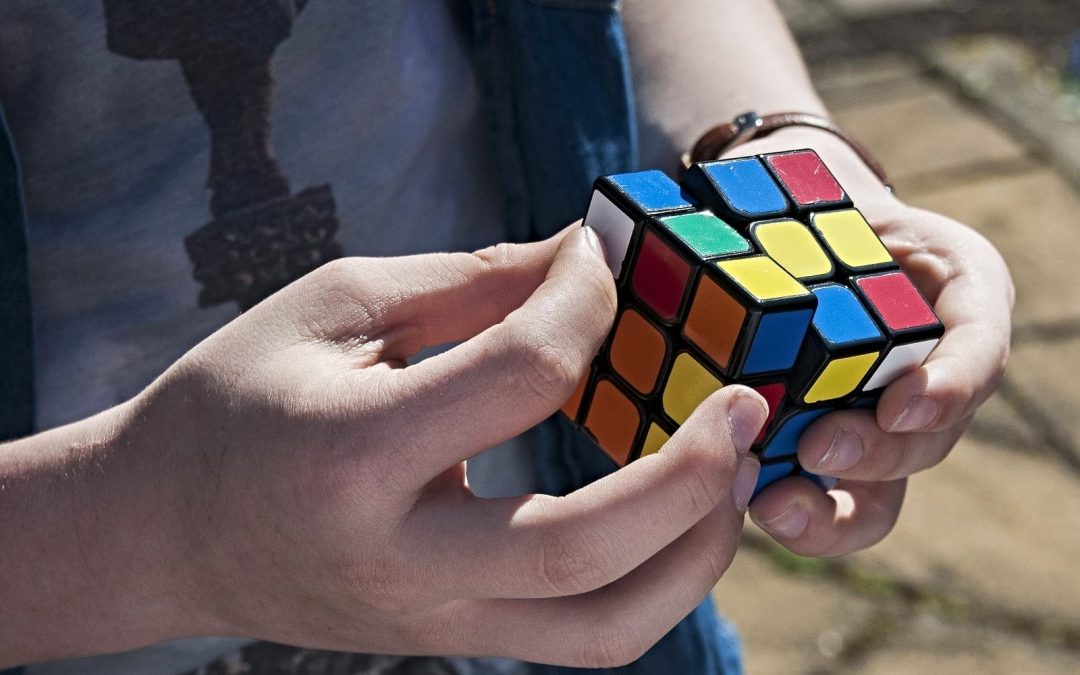In order to make a recent online order up to the amount that qualified for free delivery, I bought a Rubik’s cube.
When they first came out, I was a teenager and I got hold of one. I learned how to solve it and spent a lot of free time trying to solve it as quickly as possible.
I was delighted when I managed to do it in 45 seconds on one occasion, and my average time got down to about 1 minute.
There are a few moves you have to know, and you need to know where and when to do them. I was pleased with myself.
I don’t know I could solve the cube as quickly as that now, but I am enjoying the challenge of solving it (each time is almost certainly different to the last because of the number of permutations of a cube).
There is something satisfying about being able to transform a mixed-up cube back to its solved state.
However, my pride at being able to solve the cube was put in perspective when I saw a video of people solving the cube in about six seconds!
They do have special “speed” cubes but even so it’s astonishing to witness. My method of solving the cube would not work at such speeds so it is clear they have another approach.
Part of my enjoyment is also tactile. There is something satisfying about the way that a Rubik’s cube moves.
The noise it makes. The smooth clacking as the cubes are rotated. Even the way the cube fits into my hand and can be flicked by my fingers is soothing.
And there is a sense of fulfillment about reorganizing the confusion and returning order.
Each time I succeed is a victory for order over chaos (albeit a tiny and insignificant one). It’s also a victory for persistence over hopelessness and logic over muddle.
Life could be described as being like a Rubik’s cube in that it can be chaotic, disorganized and frustrating.
It is also unlikely we will come across exactly the same permutation of experiences in life, even if there are similarities.
And there are some people who seem better at life than others (often they also try to sell us their advice).
But, of course, life is not like a Rubik’s cube. It’s not always possible to solve it.
We can’t simply apply the right moves in the right order and at the right time to resolve difficulties, trauma and horrific events.
Logic can’t always be applied. Sometimes, the answer to life is that it sucks and it’s awful, and we can’t change our circumstances.
What we need then is not someone on a video (or blog) telling us how to solve things, we need people who resolve to be with us.
I know some people avoid people who are going through rough times because they don’t want to say the wrong thing or wouldn’t even know where to start with saying anything.
The good news is that words aren’t necessary. They don’t need to give us advice, answers, resources or solutions. They just need to have the wisdom to know that being with us is enough.
A hug can say more than a thousand words. A reassuring smile can be louder than a 1000-watt speaker system. An empathetic tear can be more effective than hundreds of advice videos in helping us to cope.
That, for me, is one of the amazing things about Jesus. One of the ways he is described is “God with us” (Matthew 1:22-23). And he has promised that by his Spirit he remains with us and in us (John 14:26).
He experiences our deepest depths and darkest darkness with us. The Bible even says that when we can’t articulate words, the Spirit translates the groans within us into prayers in the throne room of heaven (Romans 8:26).
Jesus asks his followers to emulate him, which means that we can be “God with us” to others.
Yes, there may be practical things we can do to help but starting by “being with” is an astonishingly powerful thing.
When, last year, I was trying to recover from my heart surgery, the best moment of the day was when my wife, Sally, and family and friends came to visit.
I learned what Sally’s footsteps sounded like in the corridor and that lifted my spirits.
They didn’t need to say or do anything, simply them being there was wonderful for me.
And knowing that those who could not physically be there with me were praying for me was an immense encouragement.
The McFlurries and other treats people brought me helped, of course, but just knowing that I was not alone and that I was loved was the best medicine.
I am not going to be as glib or frivolous as to suggest that knowing that God is with us is enough and that simply being with someone is all that is needed.
Of course, we want terrible circumstances to be improved and there may be things we can do to help with that (like when my nurse sister spoke to the ward staff on my behalf when I was in excruciating pain).
We want to believe that there is hope – that even though God is with us as we walk through the darkest valley, the valley has an end.
But knowing that we are not alone, we have not been abandoned, is a good start.
Who needs you to resolve to be there for them?
Editor’s note: A version of this article first appeared on Lear’s blog, Nukelear Fishing. It is used with permission.
Nick Lear is a regional minister of the Eastern Baptist Association in the United Kingdom.

